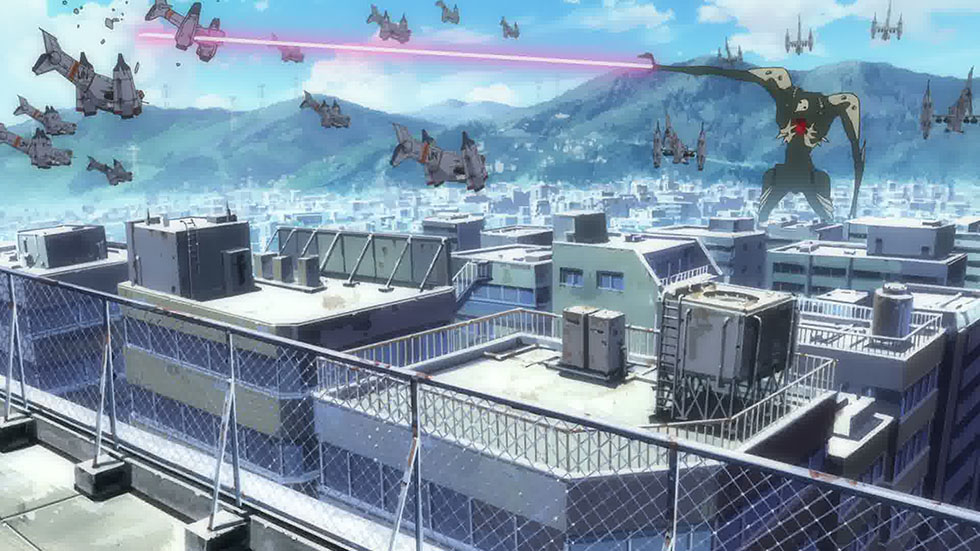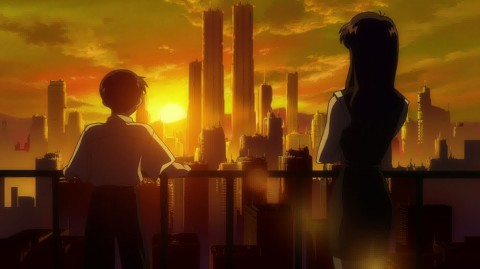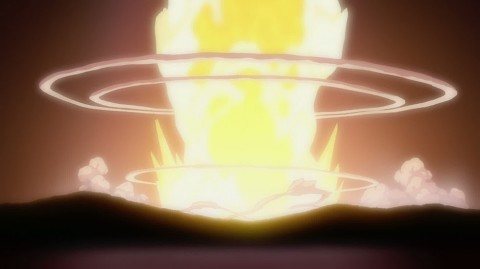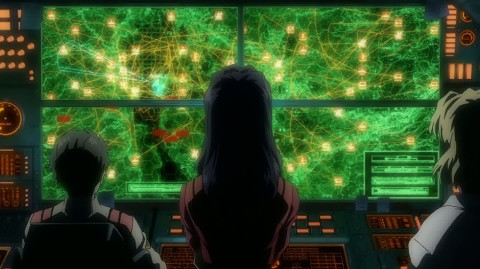Evangelion 1.11 – You Are (Not) Alone – review
Blu-Ray Release by Funimation
Directors: Masayuki, Kazuya Tsurumaki, and Hideaki Anno (Supervising)
Writers: Hideaki Anno, Yoshiki Sakurai
So, I recently picked up the blu-ray release of Evangelion 1.11: You Are (Not) Alone, and realised that not nearly enough people know about this thing.
More than a few of you are probably familiar with the original Neon Genesis Evangelion, but for those who aren’t, here’s a primer: Shinji Ikari, an introverted teenaged boy with obvious family issues, on top of the usual “bundle of hormones and crazy”, has just arrived in Tokyo-3, one of the last big cities left in a world that has nearly been wiped out by the arrival of Angels, monsters from outer space who have come to Earth for an unknown purpose. Straight off the bat, his father tells him that the only reason he’s even speaking to him (after three years apart) is because he needs Shinji to pilot an experimental weapon against the Angels.
Yeah, “Hi son, haven’t seen you in three years, go fight an evil space monster of unstoppable power for me, there’s a good boy.” No wonder the kid is fucked up.
The series evolved from there, introducing two other young pilots, the ephemeral Rei, and the egomaniacal Asuka, and slowly expanding on the subtle horror themes that underly an otherwise largely standard “giant monsters vs giant robots” anime series, first subverting the genre, and in about the last third of the series turning it completely on it’s head.
Sadly, it’s something of a flawed classic; a noble experiment, that came about at a time when nobody in Japan seriously considered the idea of an anime series telling a serious and thought provoking story. The problems of publisher expectations (and audience expectations) were compounded by serious budget issues (the last two episodes were done using scrapbooks, apparently because the animation budget had literally run out) and alledgedly by the writer / director being in quite serious need of therapy… or at least a friendly hug and some Prozac.
And yet, you cannot help but love it. The story is epic in scale, and yet deeply personal, a battle for the fate of humanity that rests in the hearts of the heroes. The characters are vivid, and each uniquely flawed. Even the direction and cinematography is full of clever surprises. It’s a series you find yourself apologising for, because you would hate for it’s many flaws to keep someone from finding all the things you loved about it.
Well, happily, I no longer have to make any apologies. Creator Hideaki Anno decided that it was time to give Evangelion what it deserved. Two decades on from the original he has returned with the same team, but twenty years more experience, no publishing constraints, and the kind of animation budget that would make Disney blush. The script has been redrafted from start to finish, restructuring the story, and reworking dialogue, to retain the strongest elements whilst correcting many of the faults of the original. The voice acting is a little more assured, the directing more confident. The results of the new budget, and the animation technologies that Gainax have been pushing in the last few years, really get to shine, especially in 1080p.
The project will eventually rework the entirety of the original story into four feature length movies. The first of these is available in an English language release (both subtitled and dubbed, though the dubbing by Funimation is really quite dire), and the second has been released on disc in Japan, but is still waiting for an English release. Whilst the first film plays pretty close to the series, the second is a clear departure, and we’ve been promised an entirely rewritten for the third and fourth.
So, specifics of the remaking aside, how does the first of the films stand-up on it’s own? Pretty damn well really. Although the film is only the first of four parts, it carries and resolves a strong dramatic arc, bringing the hero to a very different place by the end of the story, even though the circumstances he is in haven’t really changed at all. Instead it’s Shinji’s attitude to his life and the people in it which has evolved, revealing a stronger self through the trials of battle. It’s a fundamentally dramatic arc, with the battles serving less as physical obstacles, and more as glimpses into the darkening state of Shinji’s psyche.
Rather than try to introduce every element of the series in the first film, the creators wisely keep things quite sparse, focusing almost exclusively on the relationship between Shinji, Rei, and Shinji’s father, Gendou. Both Rei and Gendou are quite remote figures; emotionally cold individuals who express themselves through the negative space of silence and inaction. In situations where other people would be driven explosive outbursts, they demonstrate uncanny stillness, and the story does a surprisingly good job of investing tension and emotion into two characters so thorougly defined by a lack of movement.
Perhaps the biggest strength of the film, given the bleak outlook of the story, is in finding surprising moments of beauty. Some of the shots of Tokyo-3 are particularly spectacular, and offer a surprisingly hopeful lift to the story. Even the comedic asides offer a strong counterpoint to the otherwise quite dark material, and actually serve to pull the whole thing back from wallowing completely in a miasma of emotional despair.
Unfortunately, and doubtless partly as a fault of translation, the dialogue can feel clumsy in places, and whilst most of the supporting cast are quite well developed, there are a few who feel like little more than one note. The film also has a somewhat overbearing love for pseudo-scientific techno-babble, which can frequently lead to jarringly overwrought declarations. Less forgivable, some of the dramatic beats, especially early on, are a little over-played, without enough set up to justify the over-emotional acting and slightly heavy-handed musical cues.
In a broader sense, the story can take some work to follow at times. There’s a lot of background to the setting, much of it hideously complex, and wrapped up in something involving biblical apocrypha, ancient prophecies, science and magic and whole lot else. Wisely, the film-makers have opted to leave most of this material for the second film, leaving just the barest essentials in place for the first, which minimises the exposition overload, but requires the viewer to pay careful attention in order to keep all the pieces in place.
Flaws, all, but not nearly enough to truly distract from the powerful dramatic storytelling underpinning an excellent science-fiction film. I know I’ve come back to this a few times already, but it’s really the sheer scale of Evangelion that engages you; it’s a story that’s not afraid to be big, and dark, and intense. Sometimes it stumbles, shouldering that load, but it’s got more balls than just about any other science fiction story I’ve seen in a long while, and for that alone I’ll gladly forgive it’s clumsiness.
Screenshot Gallery:
































[…] This post was mentioned on Twitter by Doug Groves, rgbFilter. rgbFilter said: Evangelion 1.11 – You Are (Not) Alone – review: Blu-Ray Release by Funimation Directors: Masayuki, Kazuya Tsurumak… http://bit.ly/arsZ09 […]
481302 299045Thank you for your extremely excellent details and feedback from you. san jose car dealers 854161